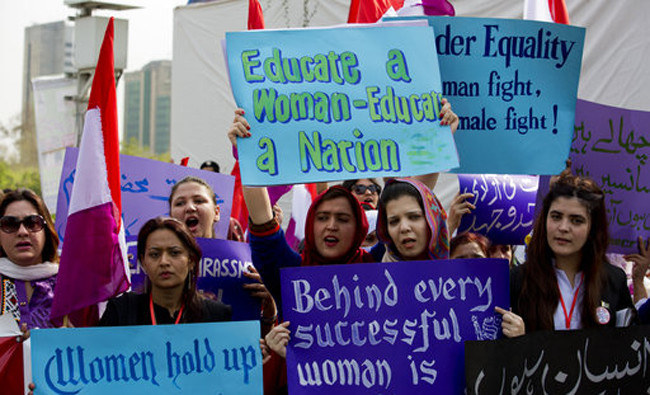The mother yells for her young daughter, “Amina, don’t stand on the balcony; there are boys outside.” Amina doesn’t protest, and instead of throwing a fight, comes inside. She stares at her mother in quiet indignation, feeling a constricting feeling in her chest. We have all been or known Amina. When she walks towards school, the catcalls make her clutch her books to her chest. She is not allowed to ride a bicycle. She hears her silent mother being yelled at by her father and knows of various aunts that come to family events with plum marks around their eyes and around their wrists, yet they never pack their lives and leave.
You and I woke up one day and found that Pakistan had been ranked dead last in the Gender Gap Report of 2025. It was jarring. A heavy concern gathered around the corners of our mouths, “Are we that behind in the race of equality?” Yes, we are. Yes, we are fighting a silent battle that never seems to end.
It starts inside the home, in the way a male child’s birth is a source of a puffed chest and celebration, yet a female child’s mere existence is a commonly acknowledged burden. The fear of her Naseeb permeates every benevolent gaze that falls on her. We thought we had entered a new, modern era—until the police rescued another infant girl out of a hastily dug grave. The way that the mere existence of the genders is treated this differently prophesies the ways their lives will fare.
After the home, the streets and the roads open a gaping maw of unease. “Arrey, Ma Sha Allah” (insert some pairs of lecherous gazes) rings out as a woman walks down a road. These gazes never seem to stop; the self-consciousness never seems to let go of her steps. But this won’t end with gazes; a bike will pass fast, and the man sitting in the back will touch a woman inappropriately and zoom away, even before she processes what happened to her. There is no accountability, no judgement.
It is of no surprise to us when we hear of girls being made to drop out of schools due to miscellaneous reasons that are somehow attached to their genders. When I asked a girl of my acquaintance why she wasn’t pursuing higher education, she said, “Bas bhai ney kaha itni parhai kafi hai. Kya karlogi parh key” (Brother said you’ve studied enough. What can you even do after studying so much?). Many girls don’t even make it past eighth grade. I remember I had a friend who didn’t even go to high school. She was intelligent and keen but didn’t put up a fight when they took her out of school. “Hamari taraf aisi hi hota hai” (It is the way things are on our side) were her parting words to me.
And if you think education changes things much, think again. The Aurat Foundation found out that 90% of women have faced workplace harassment in Pakistan. The rock bottom spares no woman; it works its way past age, education level and the background where she comes from. In certain classes of individuals, the effects might be somewhat lessened, but they ensure that they are felt.
And the rock-bottom psychology is very potent—it makes the victim feel she is somehow lesser than the crowd that jeers at her around street corners, the boss that can’t be questioned, and the thief of safety that can’t be brought to justice.
After a lewd gaze, it’s the woman that feels shame. And shame for what? For existing? For having the audacity to occupy a public space? She learnt it from the inherent fatigue in her mother’s voice. “It is what it is” sealed all voices of protest. It diminished the dreams we had so that it could fit into the mould of what is “allowed”.
But as Allama Iqbal had said:
Hamnava mein bhi koi gul hun ke khamosh rahun.
“Am I a flower that will remain silent?”
And Iqbal was right; how can a human being stay silent? The resistance against the rock bottom is alive, pushing against boundaries, gaining ground daily. 2025 saw an increase in the purchase of the ladylike scooter. The women have started claiming the roads, slowly but surely. A CD70 with three women on it, snaking the bustling road—it is a display of resistance more effective than banners and slogans. And in today’s world, resistance lives on in Instagram hashtags, in the increasing comfort in saying the word “No”; it thrives in the form of those women who dream of studying abroad, who post the stories of their solo travels.
It is a time-taking process, a long road. The cleaner lady in my university has escaped an abusive marriage and tells me that one day her daughter will walk the hallway she cleans—but with books in her hands and awareness in her steps.












